Nectandra warmingii is a species of plant in the family Lauraceae. It is endemic to savanna regions of Bahia and Minas Gerais states in Brazil.

Malaxis, commonly called adder's mouth, is a genus of terrestrial and semiepiphytic orchids. The generic name signifies "smooth" and alludes to the tender texture of the leaves. There are approximately 182 species, found mostly in tropics but with some species in temperate regions.

Hammarbya paludosa is a small orchid commonly known as bog orchid, bog adder's-mouth or bog adder's-mouth orchid. It grows in bogs in temperate and subarctic regions of the Northern Hemisphere.
Utricularia warmingii is a small, annual suspended aquatic carnivorous plant that belongs to the genus Utricularia. U. warmingii is endemic to South America and can be found in Bolivia, Brazil, and Venezuela.

Malaxis monophyllos, the white adder's mouth, is a terrestrial species of orchid. It is widespread across much of Europe, Asia, and much of southern Canada. In the United States, it grows mostly in southern Alaska, New England and the Great Lakes region, with isolated populations reported from Colorado and California.
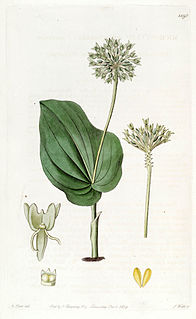
Malaxis unifolia, or the green adder's-mouth orchid, is a species of orchid occurring from eastern and central Canada, the central and eastern United States, Mexico, Central America and the Greater Antilles.

Malaxidinae is an subtribe of orchids in the tribe Malaxideae of the subfamily Epidendroideae.
Malaxis bayardii, or Bayard's adder's-mouth orchid, is a species of orchid native to northeastern North America. It is found from Massachusetts to North Carolina, with isolated populations in Ohio and Nova Scotia. There are historical reports of the plant formerly growing in Vermont and New Jersey, but it seems to have been extirpated in those two states It grows in dry, open woods and pine barrens at elevations of less than 600 m.
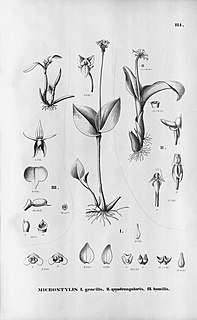
Malaxis cogniauxiana is a species of orchid native to Brazil.

Malaxis densiflora is a species of orchid native to southern India. It generally has two leaves and purple flowers.

Malaxis discolor is a species of orchid that is endemic to Sri Lanka.
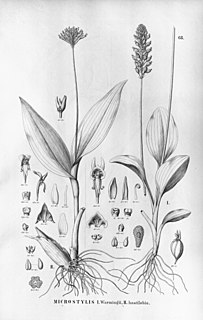
Malaxis excavata is a species of orchid widespread across much of Mesoamerica and South America from Mexico to Argentina. It has green flowers in a flat-topped array.
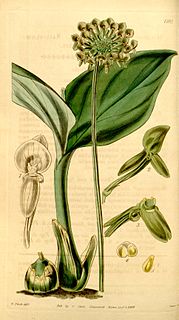
Malaxis histionantha is a species of orchid native to Latin America. It is widespread from Mexico to Argentina. It generally has two leaves and a more or less spherical cluster of small green flowers.
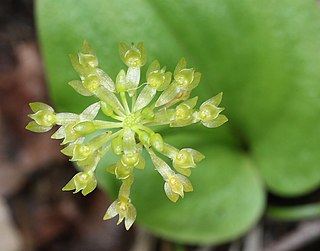
Malaxis brachystachys is a North American species of orchid native to Mexico, Central America, and the southwestern United States (Arizona). It usually has only one leaf, though occasionally two. Flowers are small and green, in a flat-topped array.
Malaxis porphyrea, the Cochise adder's-mouth orchid, is a species of orchid native to northern Mexico and the southwestern United States. It is an herb up to 45 cm (18 in) tall with only one leaf below tiny purple flowers in an elongated cluster.
Malaxis macrostachya is a species of orchid widespread across much Mexico, Central America, and the southwestern United States. It has only one leaf per plant, along with a tall flower stalk with as many as 160 tiny, green flowers.
Malaxis wendtii, the Wendt's adder's-mouth orchid, is a North American species of orchids native to northern Mexico and the US State of Texas.
Malaxis ehrenbergii, the Ehrenberg's adder's-mouth orchid, is a Mesoamerican species of orchid native to northwestern Mexico. It has been found in Mexico, Guatemala, and El Salvador.
Malaxis boninensis is a species of flowering plants in the family Orchidaceae, native to the Bonin Islands and the Volcano Islands, both belonging to Japan. It grows on the ground from pseudobulbs. It was first described by Gen-ichi Koidzumi in 1918, as Microstylis boninensis, and transferred to Malaxis by Kunio Nakajima in 1975.
Sebastiania warmingii is a species of flowering plant in the family Euphorbiaceae. It was originally described as Excoecaria warmingiiMüll.Arg. in 1874. It is native to Minas Gerais, Brazil.









